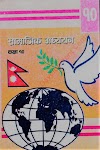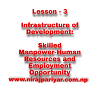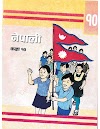History and Culture Exercise : Question Answers and Grammar Class 11 Guide English Notes NEB 2081-2024
UNIT-4
History And Culture
Ways with words
A. Match the words with their meanings.
Brevity ➜ lasting only for a short time
Conquest ➜ victory over a place or people by use of military force
Resemblance ➜ the state of being alike
Barbarian ➜ a member of an uncivilized group of people of culture
Ally ➜ one state united to another by a treaty or a league for a military purpose
Nobility ➜ state of being noble in character, quality, or rank
Ruthlessness ➜ character of having no pity or compassion
Decimation ➜ the killing or destruction of a large number of a population
Harsh ➜ cruel
Elixir ➜ liquid that is believed to cure all ills
B. Find the following words in the text and use them in sentences of your own.
Invasion
The people live under a constant threat of invasion.
Disregard
The present article will disregard this distinction.
Paramount
His happiness was of paramount importance.
Populace
They had the populace on their side.
Revolt
The peasants’ revolt was crushed by the king.
Assassination
He was in constant fear of assassination and distrusted all around him.
Serfdom
It has reduced us politically to serfdom.
D. Consult a dictionary and prepare a list of ten homographs.
Bass – a type of fish/low, deep voice
Bat – a piece of sports equipment/an animal
Evening – smoothing out/after sunset
Bear – to endure/animal
Close – connected/lock
Lean – thin/rest against
Bow – bend forward/front of a ship
Lead – metal/start off in front
Skip – jump/miss out
Fair – appearance/reasonable
Comprehension
B. Answer these questions.
a. Why is the Zhou Age called a feudal age?
The Zhou Age is called a feudal age because Zhou period had followed the rule of feudalism.b. What is the location advantage of the Qin?
The location advantage of Qin is the territory or area of dynasty is well bounded by mountains.c. What contributed to the success in the warfare as described in the text?
The location of the state, their size of the army, and their expert use of the chariot contributed to their success in warfare.d. Why did the Qin invite the foreign advisor, Shang Yang?
The Qin invited the foreign advisor, Shang Yang due to the lack of intellectual peoples in Qin.e. What were the key features of the Qin political system?
The key features of the Qin political system were fear and control.f. How were the people treated during the Qin Period?
The people were treated almost like slave in that period. People were supposed to contribute in all projects for welfare of Nation and were deprived from the approach of education.g. Why did Shi Huangdi stop educating ordinary people?
Shi Huangdi stopped educating ordinary people because he believed that illiterate people can be controlled easily.h. What did the Qin achieve by the legalism in practice?
The Qin achieved superior army, disciplined populace, obedient peoples, the great wall, great canal etc. by the help of legalism.i. Why did Shi Huangdi never sleep in the same room for two consecutive nights?
Shi Huangdi never slept in the same room for two consecutive nights because of constant fear of assassination.j. What are the everlasting marks of the Qin Dynasty?
The everlasting marks of the Qin Dynasty are as follows:1. The Terracotta Army
2. Concept of Legalism
3. The Great Wall of China
4. The Grand Canal
5. Roads.
Critical thinking
a. The Great Wall and the Taj Mahal are the creation of the autocratic rulers. Present your view for or against this statement.
Yes, I believe that the Great Wall of China and the Taj Mahal were created by autocratic rulers. The Great Wall of China was built to protect the northern empire of China from enemy attacks. There are nineteen walls. The first wall was built in the 7th century BC.The Great Wall of China cannot be built by individual effort. As punishment, people were forced to undertake such projects by autocratic rulers. The text mentions that people throughout the empire must share responsibility with each other. If a person did not behave according to the rules, others had to contact them. If they did not, they were dismembered or beheaded. Those who made the greatest contribution to the state were highly rewarded, while those whose lives were deemed inconsequential were used as slaves in Shi Huangdi’s construction projects such as the Great Wall of China, the Grand Canal, and the streets that grew up in the simple trade and travel.
Likewise, Taj Mahal is the result of the autocratic ruler of the Mughal Emperor of India, Shah Jahan. It is believed that he built it to immortalize his wife Mumtaz. Shah Jahan is said to have cut off the artists’ hands to prevent them from recreating the same type of structure. Historical facts show that the king was more inconsiderate than romantic. It took 20,000 workers to build the Taj Mahal over 20 years.
Everyone remembers the names of the emperors who built the structures, but no one is eager to explore the reality behind the structures. Therefore, The Great Wall and the Taj Mahal can be considered as the creation of the autocratic rulers.
b. How do you describe the pros and cons of feudalism?
Feudalism is defined as a dominant social system that existed in Europe during the Middle Ages in which people worked and fought for nobles who gave them protection and the use of land in return.Pros of feudalism
Feudalism helped protect communities from the violence and warfare that broke out after the fall of Rome and the collapse of strong central government in Western Europe. Feudalism secured Western Europe’s society and kept out powerful invaders. The Lords were the major persons who keep away people’s worries. Feudalism helped people to develop the qualities like loyalty, bravery, generosity, and humility.
Cons of feudalism
The concept of feudalism used to divide poor and rich people into two classes. It created class divisions among people. Common and weak people had to be dependent upon the Lords. Easy environment for powerful people to impose their power over others. Lords could easily do whatever they wanted. Peasants had to survive under the lords and they were not allowed to leave their lords’ land. They were restricted in movement and even daily activities without their lords’ permission.
Writing
a. Write an email to your friend living abroad stating the contributions of Prithvi Narayan Shah in the unification of Nepal.
To: ariana23@gmail.com
From: austinadam56@gmail.com
Subject: Contributions of Prithivi Narayan Shah in the Unification of Nepal
Following the recent discussions on the above subject, here are more clarifications on the immeasurable contributions that Prithivi Narayan Shah brought to ensure that Nepal is what it is today.
Shah ended the divisions and infighting that existed between the four major Nepalese principalities of Gorkha, Malla, Patan, and Bhadgaon. Though the prince was a very ambitious member of the Shah ruling family of Gorkha, his personal involvement brought the wars among Malla, Patan, and Bhadgaon to an end.
He did not stop there. He resolved their long-term differences and consolidated them to become modern-day Nepal. Shah also worked hard to strengthen the unity of Nepal. This unity ended the many years when foreigners could easily invade any of the small states to conquer them.
No doubt, you will appreciate that this was not a mere achievement. While others were dividing nations, he united. While others conquered nations for their selfish interests, he strengthened Nepal for national unity.
From this brief email, you will appreciate that Shah made lasting contributions to the Nepal we can call home today.
From your friend,
Austin
Grammar (Past Tense)
B. Complete the texts below using the correct past forms of the verbs from the bracket.
a. The Maya established a very advanced civilisation in the jungles of the Yucatan. However, their culture disappeared (disappear) by the time Europeans first arrived (arrive) in the New World.b. When I turned (turn) on the radio yesterday, I heard (hear) a song that was popular when I was (be) at the basic level of my study. It took (take) me back to some old memories.
c. I was looking for a job. I applied (apply) for a job last week. Fortunately, I got (get) it and now I am a job holder.
C. Choose the correct words from the list and complete the sentences with the correct verb form.
a. Newton saw an apple falling from the tree.b. Ramesh Bikal wrote many popular stories.
c. My jacket is expensive. It cost me Rs 5000.
d. She got up early in the morning yesterday.
e. When I was small, my father taught me at home.
f. Why did you throw the cap away?
D. Put the verb into the correct form and complete the sentences.
a. I went to see the film, but I did not it. (not/enjoy)b. I met Rojina in town in a few days ago. (meet)
c. It was very warm, so I took off my coat. (take off)
d. Though the bed was very comfortable, I did not sleep very well. (not/sleep)
e. I started new job last week. (start)
g. He was too busy in the office yesterday. (be)
h. Nita invited her to the party, but she didn’t come. (invite)


.jpg)



.png)



.gif)



0 Comments